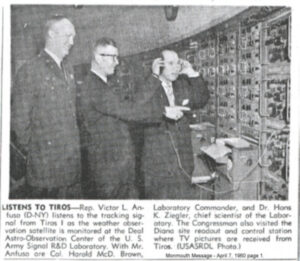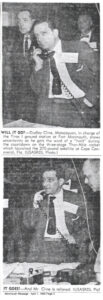The History of InfoAge Science & History Museums
Space Age - Monmouth Message April 7, 1960 ‘Only The Beginning’ For LaboratoryMonmouth Message April 7, 1960 ‘Only The Beginning’ For Laboratory

LISTENS TO TIROS – Rep. Victor L. Anfuse (D-NY) listens for tracking signals from TIROS I as the weather observation satellite is monitored at the Deal Astro-Observation Center of the U.S.Army R&D Laboratory. With Mr. Anfuse are Col. Harold McD Brown, Laboratory Commander, and Dr. Hans K. Ziegler, Chief scientist of the Laboratory. The congressman also visited the Diana site readout and control station where TV pictures are received from TIROS I. (USASRL Photo)
Published in The Monmouth Message on April 7, 1960, on pages 1 and 3.
Fort Monmouth – Launching of the Tiros I satellite late last Friday morning, was only the opener for Signal Laboratory scientists, engineers and technicians working with the National Aeronautics and Space Administration in the meteorological experiment.
Since then, the ‘readout’ and control station at the Diana site, Evans Area, has been operating around the clock in an equipment-filled room under the shadow of the Space Sentry, a 60-foot dish-shaped antenna pointed toward the skies
Meantime, the second major readout station was receiving other pictures at Kaena Point, Hawaii.
Tracking Signals
In addition to receiving and processing weather data, the Laboratory is monitoring tracking signals from Tiros radio beacon at the Diana site and the Astro-Observation Center near Deal. The track of the 270-pound ‘bird’ also is being followed by radio direction finding stations at Monmouth Airport and Collingwood Park, both near here, and at Kaena Point.
The Signal Laboratory’s big assignment is being carried out by the Astro-Electronics Division, directed by Samuel Brown with Herbert Butler, chief of Astro-Instrumentation Branch, serving as a project manager. Dudley Cline, deputy chief of Mr. Butler’s branch is in-charge of the local readout station, while Lloyd Manamon heads the Deal operation and Harald Jaffe the radio direction finding. The Deal and Diana sites comprise the Astro-Observation Branch, headed by Alan Gross.
The Tiros pictures were first sent to Washington by a facsimile wire system set up and operated by the Data Processing Facilities Division Under the direction of John A. Erhart, chief of the Graphical Data Section.
Some 50 Laboratory employes and Signalmen, plus personnel from RCA, have a direct hand in the successful project.

WILL IT GO? – Dudley Cline, Manasquan, in charge of the ground station at Fort Monmouth shows uncertainly as he gets word of a ‘hold’ during the countdown on the three-stage Thor-Able rocket which launched the 270-pound satellite at Cape Canaveral Fl. (USASRDL photo)
Other Contributors
Besides Mr. Cline, those conributing to the readout operation are: Ewart Annett, William Chamberlain. Paul Gorpatch, George Goubeaud, Guy Hays, Earl F. Hicks, Charles Krauss, Frank Lazibeth, Wiliam F. Loehning, Lawrence E. Martin, John Mount, Arthur Reinbolt, Harold Pontecorvo Richard Tustin, Bert Gadsby. Walter Caruba, George Swistak, Arthur Fountain, William Wele William Junkelman. J T. Simpson, Sp5 Charles Rimmey, Sgt. Donald D. Doppe, Sgt. Edward J. Fischer Jr., Sp5 Robert Ortt p4 James Molnar Sp4 James Downing, PFC Wilfred Klein, PFC Edward Stack, PFC Joseph G. Skvasik, PFC Aaniel Carroll, PFC Jay Mehalek. The RCA personnel include Ciro Martinelli, senior engineer, Lou s G. Layton, and Randall J..Joyner. Edward Rich and Alan Diamond, both of the Signal Laboratory, were at Cape Canaveeral for testing, final checkout and launching.
Direction Finders
Mr. Jaffe’s radio direction finding force in this area included David Pfaff, Paul Foged, Fred Evans, Steven Munn, and Benjamin Lane, while Walter Day is serving with an RDF group in Hawaii.
Working with Mr. Manamon at the Deal station, where all satellites are tracked, were Samuel Findler, John R. Wills, Richard Hosbach, Sgt. Paul Manno ad Mrs. Doris McAlister.
Charles Schifflin of the Laboratory served as a resident engineer for the Astro-Instrumentation Branch at the RCA plant, while Robert Boyd was a coordinator on the contract with the firm. John Maskasky is at Kaena Point as chief technical advisor at the data read-out and control station located there. Sgt. Jerome LaMarre also is on duty in Hawaii. William Richards, a physicist, worked on orbital problems and meteorological aspects of the project.
Supporting Units
Astro-Electronics Division, a part of the Communications Department, was supported in a various way in the project by numerous other areas in the Laboratory, including Solid State Devices, Electronic Parts and Materials, Frequency Control, and Power Sources Divisions, all of the Electronic Components Research Department; — Equipment Analysis, Engineering Design, and Fabrication Divisions and the Antenna and Wire Construction Section, all of Engineering Sciences Department, and Surveillance Department, including its Meteorological Division.
Mrs. Ruth Gardner, secretary to Mr. Butler, handled a multitude of appointments, arranged conferences, trips, travel orders, and other details while the satellite was being built.
Page created July 4, 2004
We Need Your Help! Volunteer with Us.
Join our mission to preserve historic Camp Evans and teach the public about science and history.
Sign up to join our team of volunteers and start on your own mission today.
InfoAge Science & History Museums
2201 Marconi Road
Wall, NJ 07719
Tel: 732-280-3000
info@infoage.org
webmaster@infoage.org

